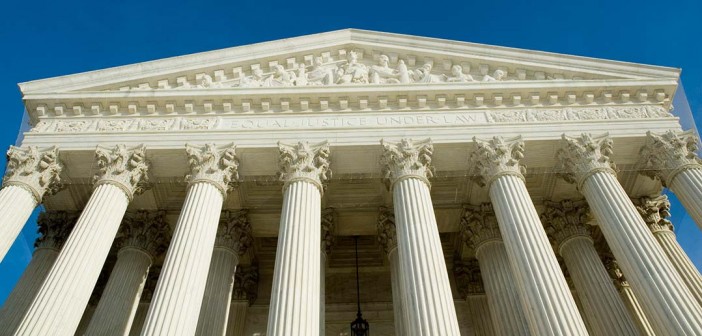On January 12, a Fordham Law Tax Litigation Clinic case was mentioned twice during oral arguments in the U.S. Supreme Court on the issue of whether the 30-day period for seeking judicial review of a tax collection determination made by the Internal Revenue Service is subject to equitable tolling.
Under the current interpretation of 26 U.S.C. § 6330, a taxpayer only has 30-days to file a petition for review of an unfavorable IRS collection determination in Tax Court. Since that 30-day window is treated as a jurisdictional requirement calculated from the date of mailing, the taxpayer can miss their filing deadline through no fault of their own, for example due to postal delays or other events like a long hospital stay.
Fordham Law students under the direction of Professor Elizabeth Maresca represented a client whose case was dismissed after her notice of determination was lost in the mail, causing her to miss the 30-day window. The facts of that case, which is still pending in the Second Circuit, were cited to the Supreme Court as an example of the harsh consequences of the Internal Revenue Service’s position that the time period is jurisdictional.
In 2018, the clinic’s client received a bill from the IRS claiming that they had failed to pay tens of thousands of dollars in taxes for their business during the 2014 tax year. However, the client had sold that business in 2009.
With the help of the Fordham Law clinic students, the client filed a request for a “collection due process” hearing with the IRS. The agency ruled against her and due to a variety of IRS and postal service errors, she wasn’t made aware of the decision until months later, missing the 30-day window to request judicial review of the case.
In the Supreme Court case Boechler v. Commission, the taxpayer argues that this 30-day window should not be treated as a jurisdictional requirement, but rather a claim-processing rule subject to equitable tolling. If treated as such, the window would open to tolling due to events outside of the taxpayer’s control. The Fordham Law clinic’s case was cited by the Boechler’s attorneys and in an amicus brief filed by Skadden Arps on behalf of the Tax Litigation Clinic and several other low-income taxpayer clinics.
“We have been trying to fix [our client’s] problem with the IRS for almost four years,” said Maresca. “It’s clear to us—and we believe that it’s clear to the IRS—that she doesn’t actually owe these taxes. Our client is low income, on a fixed income, and has no ability to pay the $100,000 that the IRS says she owes.”
A “Light at the End of the Tunnel”
With the ongoing Supreme Court case, the clinic’s client could soon hear back on the jurisdictional issue in her own case.
“We finally have some light at the end of the tunnel,” said Maresca. “Hopefully, we’ll get this case resolved for our client and she can sleep well at night, not burdened by this tax debt that she does not owe and cannot pay.”
The client’s experience with the IRS is not rare among low-income taxpayers who are less likely to have legal representation but are more likely to be audited, said Maresca. Had she not found help at the Tax Litigation Clinic, their client likely would have faced levies on her fixed income and social security as well as “relentless” collection efforts by the IRS and New York State.
“Even though we’re a law school clinic, we can handle almost any issue that comes to us because the students are so dedicated and they’re willing to work so hard and get a case resolved in favor of their clients,” said Maresca.
Fordham Tax Litigation Clinic Students Step Up
One of those students includes recent graduate Shanice Harris, an associate at Ortoli Rosenstadt who had worked on the case prior to graduating in 2021.
“It is so rewarding to see the work from the tax clinic being mentioned by the Supreme Court and a great reminder of how connected the legal community is,” said Harris. “Discussions about injustice can lead to great and lasting change, which is exactly what I believe is transpiring with the pending Supreme Court case and what Professor Maresca and her tax clinic students have been advocating for with this case.”
Currently, the Fordham Law client’s case is in abeyance. Depending on what is determined by the Supreme Court, it will either return to the tax court for a hearing on the underlying merits or be dismissed completely.
“The students did incredible work on this case,” said Maresca. “Without them, I don’t know where our client would be.”




